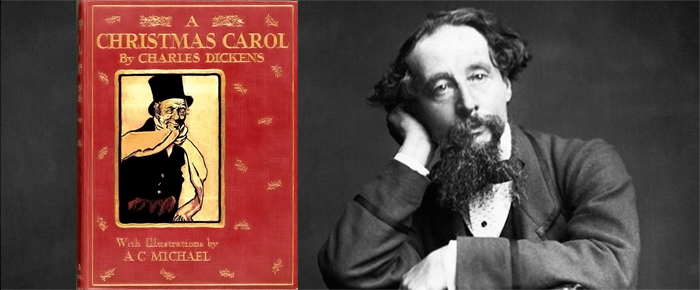
By Heidi Simmons
—–
“A Christmas Carol”
by Charles Dickens
Novella
—–
“I am sure I have always thought of Christmas time, when it has come round – apart from the veneration due to its sacred name and origin, if anything belonging to it can be apart from that – as a good time; a kind, forgiving, charitable, pleasant time: the only time I know of, in a long calendar of the year, when men an women seem by one consent to open their shut-up hearts freely, and to think of people below them as if they really were fellow-passengers to the grave, and not another race of creatures bound on other journeys.”
This long sentence is part of a speech Dickens has Fred say to his uncle, Ebenezer Scrooge in the first chapter of A Christmas Carol about why he celebrates Christmas. After Fred’s invitation to Christmas dinner is rebuffed, the two argue the holiday’s significance and meaning. Fred’s reference of the “fellow-passengers to the grave” is, as we all know, an ominous foreshadowing of what is about to come.
A Christmas Carol. In Prose. Being a Ghost Story of Christmas, by Charles Dickens was published in London by Chapman & Hall on December 19, 1843. It has been adapted for television, film and stage too many times to count. This story and many of its characters have become cultural references and seasonal icons.
If you have never read A Christmas Carol, you might be surprised to discover what a fun and quick read it is. Depending on the publication, and if there are illustrations, the story is told in just five chapters and is less than one hundred pages.
The story is about a bitter man who has come to love only his money. He is a miser who resents the poor, social services and taxation. Scrooge feels no need to financially help anyone, including his faithful — and only — employee Bob Cratchit.
On Christmas Eve, Scrooge is visited by the ghost of his business partner Jacob Marley who says: “It is required of every man that the spirit within him should walk abroad among his fellowmen, and travel far and wide; and if that spirit goes not forth in life, it is condemned to do so after death. It is doomed to wander through the world – oh woe is me! – and witness what it cannot share, but might have shared on earth, and turned to happiness!”
Scrooge is visited by three ghosts who show him his life in the past, present and the future. He see’s for himself the big picture of his life choices, which shaped him into the friendless and money-grubbing person he has become.
By the end of a sad and terrifying night, Scrooge is able to see the error of his ways and the horrible end to his life. But instead of being defensive, angry and set in his ways, he chooses to embrace life. And for the first time he feels alive!
In the privacy of his bedroom, he lets go of his fear, celebrates joy and a gratitude for his redemption that he cannot contain. “I am as light as a feather, I am as happy as an angel, I am as merry as a schoolboy. I am as giddy as a drunken man. A Merry Christmas to everybody. A happy New Year to all the world. Hallo here. Whoop. Hallo.”
Scrooge wastes no time. He makes a fresh start with his family. Humbly asking to be welcomed into their graces.
After years of exploiting his faithful employee, Scrooge sets everything right with Cratchit, providing him a substantial raise — more than a living wage — and health care for the entire family.
Scrooge finds the gentleman raising money for the poor, a man he just a day earlier condemned for his charity. He whispers in the man’s ear the amount he intends to give. Making-up for all the years, he will not allow the man to comment and says: “Don’t say anything please. I am much obliged to you. I thank you fifty times. Bless you.”
Dickens tells the story not in chapters but in “Staves.” A musical term, like a staff, stave is the five parallel lines and the spaces in between where notes are written. A Stave is also a verse or stanza of a poem. I like to think that the spaces between the lines are the ghosts in the story boldly revealing a truth.
The ghosts gave Scrooge the chance to understand how he had become bitter and miserly. But best of all, they gave him the opportunity to understand and forgive himself.
This story is filled with wisdom and warning. It makes sense that Dickens called this novella A Christmas Carol for it is a song of redemption and joy.
It is the awakening of a greedy businessman who discovers that it is better to give and help others than grow his bank account. It is not about doing right to save his skin, but because it changes him into a better person and helps those in his community. Scrooge becomes a part of something far bigger and more meaningful than mere money.
Scrooge consciously chooses to be a generous human being not only with his wealth, but with a loving spirit and compassionate heart. Merry Christmas! And, as Tiny Tim observed, “God bless us, every one!”








































